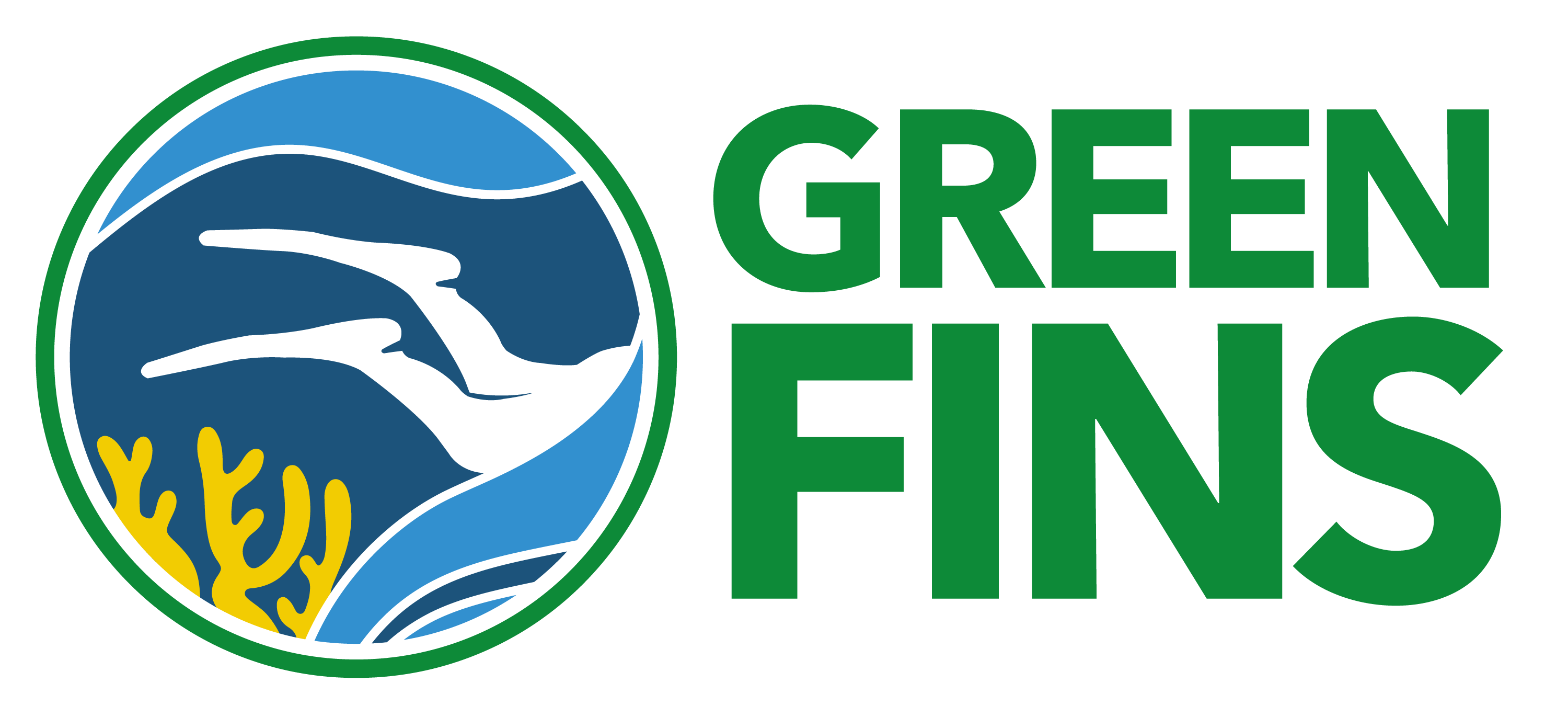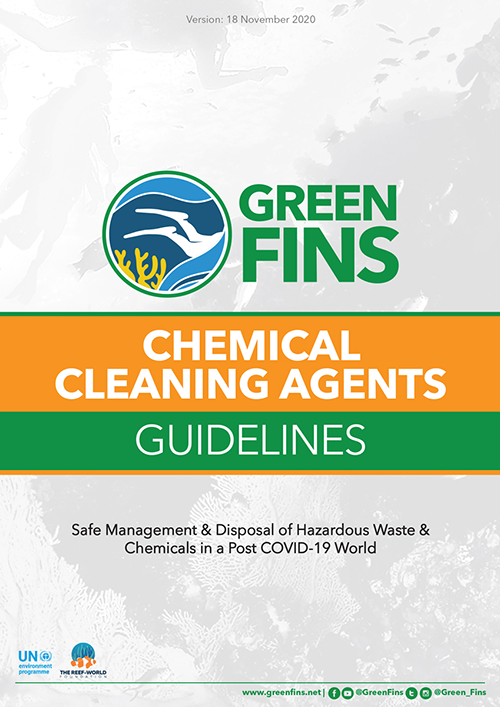Dive industry demonstrates resilience and determination to improve sustainability in the face of the COVID-19 crisis
The Reef-World Foundation – the international coordinator of the UN Environment Programme’s Green Fins initiative – is calling for the dive industry to keep sustainability high on its agenda during the COVID-19 crisis.
The charity is keen to remind dive and snorkel operators of the importance of preventing environmental threats – even during the current COVID-19 pandemic when they may not have divers in the water. Reef-World’s flagship programme – Green Fins – aims to protect coral reefs by promoting a sustainable dive and snorkel industry. Because the Green Fins Code of Conduct covers the prevention of environmental threats in all aspects of a marine tourism operation, there are still many ways in which dive operators can work to reduce their environmental impact even while COVID-19 travel restrictions remain in place.
Chloe Harvey, Director at The Reef-World Foundation, said: “We are aware this is an incredibly tough time for the diving and snorkelling industry. However, as the UNWTO said – ‘to stay home today is to travel tomorrow’. As a collaborative network we need to work together to weather this storm as best we can. Resilience is key – not only for coral reefs but also for the sector.
“While we realise it might not be possible for everyone, we recommend that those who can take this downtime to pause and prepare; having to put many other aspects of the day-to-day running of the business on hold offers operators a valuable opportunity to review all internal policies and procedures that can reduce their environmental footprint.
“A strong overarching sustainability policy should cover key environmental aspects such as: including environmental content in pre-departure documents and materials for guests; making sure staff include environmental points in their pre-dive and boat briefings; ensuring waste is minimised, recycled whenever possible; and making sure any hazardous waste (such as used engine oil or spent batteries) is collected, stored and disposed of responsibly.
“As well as reviewing policies, management could also use this time to research suitable suppliers of eco-friendly cleaning products, mask defog and reef-safe sunscreen as well as reviewing internal training sessions to make sure all staff and crew are aware of any new environmental policies, or reminded of those already in place. Dive professionals who want to continue their learning from home can also take the Green Fins Dive Guide e-Course for free online. Businesses could even start developing a marketing push to showcase their dedication towards protecting the environment as a way of attracting eco-minded customers who might be researching post-lockdown holiday options.
“While we appreciate this is a stressful time for members of the travel industry, putting better environmental measures in place now will help travel businesses come out stronger – and with a more sustainable business – when travel restrictions are lifted.”
download the green fins guidelines for chemical cleaning agents today:
How are Top 10 Green Fins members working on sustainability during the covid-19 lockdown?
Despite current COVID-19 travel restrictions, many Green Fins members are taking this time to work on aspects of their sustainability policies. These examples from some of the Green Fins Top 10 members offers dive shops around the world examples to inspire what they can do in their own operations:
Tioman Dive Centre,
Pulau Tioman, Malaysia
Rosie Cotton, Tioman Dive Centre, said they’ve been doing what they can even with obstacles caused by COVID-19: “This has been a very difficult time, as all our workers are in lockdown at their homes and only leaving the house for essential shopping. From a management perspective, we’ve taken this opportunity to review our sustainability policies and make sure everything is still as effective as possible. This is something we do on a regular basis but this lockdown has given us a bit of additional time for this type of admin, which can be difficult to get to when the day-to-day running of the dive shop keeps us so busy.
“We’re also thinking about how we might be able to make trash from previous beach cleanups – including fishing net floats – into a useful item or decoration for the dive shop, such as a wall hanging. In my spare time, I’ve been learning Macrame and so hope this new skill will come in useful as we try to find innovative ways of upcycling trash collected from the beach. As Green Fins members, we don’t display any marine life in the dive centre (such as decorations made from shells or coral) and you’d be surprised how great upcycled trash decorations can look with a bit of planning and effort!”
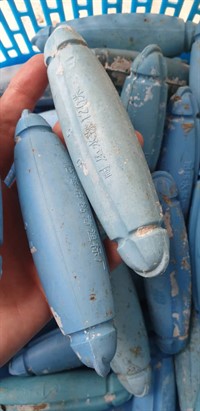
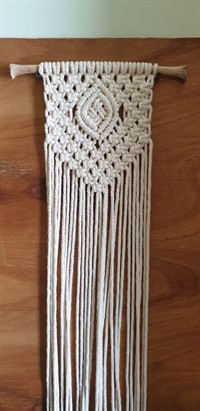
Bubbles Dive Centre
Pulau Perhentian, Malaysia
Peisee Hwang, Marketing Manager at Bubbles Dive Resort, said: “Although we are not currently in business due to the COVID-19 pandemic, we are still carrying out our Green Fins mission during this trying time. We continue to live the life that we pledge with the skeleton crew we have remaining on the resort. We are self-sustaining by consuming from our little farm and minimising our waste using our compost pile, upcycling and recycling as well as doing daily beach cleans. Diving around the island is currently prohibited but we are still allowed to access our house reef and have done cleaning whenever we can. We’ve noticed nature is coming out more during this time, so the turtle conservation team has been busy too!”
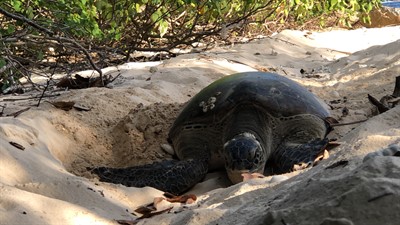
Ceningan Divers
Nusa Ceningan, Bali, Indonesia
Robert Scales, co-founder of Ceningan Divers, talked about how they’ve responded to the COVID-19 crisis: “When we announced we were closing our resort on March 19th, we expected we might only be closed for a month or so. About a week later, when the Indonesian government announced additional travel restrictions, we realised we were looking at a longer closure and we needed to find new ways to help our staff while sharing our knowledge and passion for conservation.
“One of the first projects we worked on was to make our original conservation workshops and PADI eCourses available online at https://edu.ceningandivers.com/. The goal behind this was to provide people who are interested in conservation, the environment and marine life a way of increasing their knowledge while keeping themselves busy during lockdown. The education centre has a wide range of workshops on it covering: mola, mantas, turtles, tropical fish, nudibranch, corals and more. The mola workshop is free of charge while the others are $20; the revenue generated from purchases of these courses helps us continue to support our staff during this time. We’ve also made the Project AWARE speciality courses available online for just $80; as these are non-diving courses, people can become fully certified after they complete this programme online (Each course is composed of several videos and a Knowledge Review followed by a one on one call with Gina, our in-house Marine Biologist and PADI Staff Instructor).
“We employ 24 people each of whom is responsible for looking after their family – so we have around 100 people relying on our support. That’s why we set up a GoGetFunding campaign, which has raised just over $6,500 to help us support our staff to buy food for their families, pay for electricity and buy data to keep in touch with people. For those who make a donation of $50 or more on the platform, we unlock our educational workshops for them – it’s a thank you from us to them which also benefits the environment.”
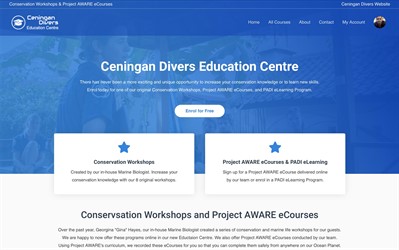
Scuba Junkie Mabul
Mabul, Sabah, Malaysia
David McCann, Conservation Manager for Scuba Junkie S.E.A.S, explained what they have been doing for the environment during the COVID-19 pandemic: “Lockdown has obviously affected our daily operations and capacity to carry out some conservation activities but also provided us with unique opportunities to develop others. We are in the process of rebuilding our jetty and dive shop – the lockdown has given us ample time to do this with as little adverse impact to the environment as possible: cleaning using biodegradable products, reusing and upcycling things from the old shop. We are also reviewing our sustainability policies in light of recent DAN guidelines on disinfecting dive equipment – exploring ways to ensure that no harmful chemicals are released into the marine environment at any point during the disinfection stages.
“Also, some of our conservation project areas have been incredibly busy – particularly the turtle hatchery. So far during the MCO we have released 930 green turtle hatchlings with four nests remaining in the hatchery. Our outreach and supporter engagement programmes have also developed with talks on marine conservation and sustainable practices hosted online for audiences around the world.
“While lockdown has had a huge knock on effect on tourism worldwide, it also presents an opportunity for the industry to reset and review. Many fragile ecosystems will have had a chance to recover; it is the perfect opportunity for the industry to explore new ways to improve on existing eco-friendly practices and enable better protection for the natural world.”
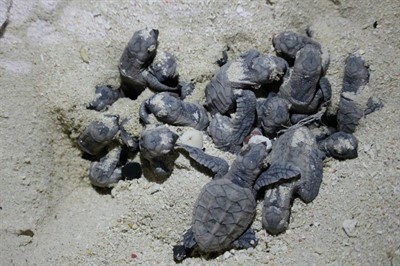
Evolution
Malapascua Island, Philippines
Matt Reed, Evolution, said: “Over the years, dive shops have collected donations from the tourists and divers who visit to be used to help protect the thresher sharks – and the environment where we dive with them – from illegal fishing. During this time when no one is diving, we realised that the dive sites could be at high risk of overfishing, especially as out of work employees look for ways to feed their families.
“As such, Evolution mobilised a collection of dive shops and, in conjunction with the local government and the Bantay Dagat (Sea Police staffed by local men from the island), we have been able to send out patrols almost every day. The participating dive shops use their boats on rotation and the dive shop pays the crew when they are on duty (which also gives them some salary). The donations previously collected are being used to fund the fuel and food for the trips, as well as the salaries of the Bantay Dagat members and, on some occasions, the Coast Guard is also joining the trips to add a larger presence and better control if an arrest is necessary. There have so far been at least two arrests of fishermen in protected areas.
“So, even under these very challenging circumstances, the local dive shops have shown that they can work together to do their best for the amazing thresher sharks and the environment in which the sharks live. Hopefully, these efforts will ensure sustainability of the livelihood on Malapascua as the entire island has been supported by tourism for many, many years and without its return the residents will surely suffer. We are doing what we can to ensure the diving remains excellent and we encourage people to help out both the ocean and the small island of Malapascua by coming to visit as soon as we can open again for business.”
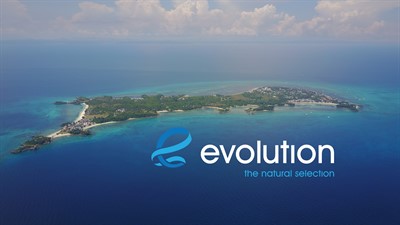
OrcaNation Rawa
Pulau Rawa, Malaysia
Jeroen Van De Waal, Founder of OrcaNation, said: “We have always had a strong focus on education; specifically helping children aged between 8-18, and through them their parents, connect with the ocean in a sustainable way. Many children in the big cities have been raised in a digital world but, in real life, Animal Planet is turning into The History Channel – you can’t flick back and forth between the two like you would on TV. That’s why part of our usual programming offers the opportunity for them to come into the field to explore, connect with and relate to the natural world.
“The current situation is extremely challenging and what we are doing right now is trying to sustain ourselves through this crisis. We were already in the process of building a Digital OrcaNation Academy,* in partnership with PADI, and we are now trying to accelerate this to add value to people who are keen to learn about underwater ecosystems from home. There will be a digital platform of 60 carefully curated awareness modules – covering topics including nudibranch, seagrass, whale sharks and much more – which have been written by Masters students around the world and carefully reviewed for accuracy. We’re hoping this platform will help us connect with as many people as possible so can continue learning about the ocean and how important it is to protect it. Those who further their skills by taking the course are also supporting the reef because, for every eLearning course OrcaNation sells, we will donate $5 SGD to the reef. We’re also about to launch our crowdfunding campaign – watch this space!
“As always, we continue to make sure all our operations are compliant with the Green Fins Code of Conduct and hope, when we’re out the other side of this crisis, that even more of our dive shops will make it into the Green Fins global Top 10 rankings.”

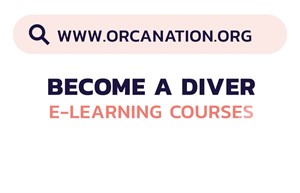
Click here for Green Fins’ COVID-19 & other resources!
For more information, please visit www.reef-world.org or www.greenfins.net. Dive and snorkel operators interested in signing up to Green Fins can find the membership application form at: https://www.greenfins.net/how-to-join.
– Ends –
